
I'm going to draw a line in the sand on the issue of David Blaine, right here and now. I believe that David Blaine is the most important magician since Houdini and that he single-handedly saved the great art of magic. Those of us in magic right now are blessed to be able to witness the most extraordinary renaissance the art has seen for a century -- and we have David Blaine to thank for it.
I have long commented to anyone who would listen that the biggest problem with magic is that it's very difficult to make it resonate as a great art. Take a top pro and let him work a cocktail party. He'll blow people away and get them laughing. But I maintain that if one of the guests breaks out a guitar and starts singing some reasonably good songs, the magic will be quickly forgotten as the music transports everyone in the room. In other words, a competent but unexceptional singer will trump even a gifted magician in almost every case.
There have been many talented magical performers over the years, some of them even quite brilliant, but no one before Blaine figured out how to make magic so astonishing that people watching it on television actually got excited, wanted to see more, and concluded that the magician performing it was the hippest guy in the room.
No one before Blaine figured out how to become a superstar doing magic. Not a famous punch line, but a genuine superstar. When David Copperfield was engaged to Claudia Schiffer, the rumor mill churned that he was gay and that their relationship was a business arrangement (he denied it). Here's a guy who's handsome and graceful, who has made $100 million doing magic -- and his girlfriend has to worry that dating him might be a bad career move!
Blaine never had that problem. He's the first famous magician who's an equal to any possible model or actress he dates. Fiona Apple, Josie Maran, even Madonna -- none of them needed to worry about how it looked for them to be sleeping with this magician.
------------------------------------------
Street Magic: Of the People, By the People, For the People
I just watched Street Magic, the very first Blaine special from back in 1997, on TLC. Just happened to be on, and I watched it.
Good lordy oh lordy. This kid's a fuckin' genius. I mean, really. Today, nearly a decade later, every magician under twenty-five of any note is doing David Blaine. That super soft-sell, totally straightforward and clear, the absolute committment to the effect, the nearly-laconic pace which ramps up the intensity...this is all Blaine.
And those eyes! That hypnotic gaze, staring intently into the eyes of his spectator. Blaine not only stares deeply into the eyes of beautiful women (an excellent technique for seduction as well as deception), but also into the eyes of men -- strapping football players, gangbangers in Compton, an elderly Chinese man. He's the first TV magician secure enough with his sexuality to risk looking gay by connecting with male spectators on a very visceral level.
Watch Street Magic again and it's clear that it's not about magic at all. It's about people. Blaine travels the world bringing magic, wonder and joy to people of all colors, cultures, and socioeconomic backgrounds. He makes everyone wonder-ful, filled with wonder, and the viewer at home feels the connnection, too.
--------------------------------------------------------
In a way, this is the project started by the late Doug Henning. Henning strove to bring the experience of magic to everyone, the sense of wonder. Henning gave magic back to the people, and the people loved him for it. I owe my own passion for magic in large part to seeing Henning perform in The Magic Show on Broadway twice in it's initial run.
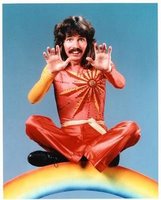
But Henning was never hip. Henning was a hippie kid, loveable but outsider. Henning gave up magic to study Transcendental Meditation, which only made him seem like an oddball to the mainstream population. I remember seeing Henning on the Merv Griffin Show in the late Seventies, talking about how advanced TM meditators could float up off the ground. A skeptical Burt Reynolds, who was also a guest, had a field day with Henning.
-------------------------------------
Evaluating Blaine
Blaine, different story altogether. Blaine, in his scruffy tee-shirt and slouchy pants, looks like every other young American. Except that he seems to possess extraordinary powers.
I know they picked the best reaction shots, the spectators whose world was turned upside-down, the occasional person who seriously questioned whether he was a conjurer or something supernatural. But all of these choices add up to something more than just promoting the cult of David Blaine. Through the vehicle of Street Magic, Blaine is a peacemaker, a uniter, a lover of humanity. Blaine uses magic to drop walls, to humanize people, to snap them out of their familiar patterns and see the world as magical, beautiful.
Genius performer. Genius.
And the guy's absolutely brilliant with a deck of cards. I know about all the magicians who like to bash him: he's not original, he does stuff I can do, he does stuff I've been doing for years, his doubles aren't clean, blah blah blah. Well, let me tell you, on that special Blaine performs a bunch of fairly sophisticated effects, not super-dooper, knuckle-busting tough, but far from easy.
His card work is graceful, smooth, and brilliantly well-covered. His use of direction and misdirection is superlative; in fact, I think most magicians are totally incapable of understanding just how well Blaine covers his work and so they underestimate his genius. This kid was only twenty-three years old at the time this special was shot. But he kills like a master.
If you're a magician and you can follow what he's doing, try watching his audience management skills. Blaine is always absolutely in control of the spectator. He knows when to give the spectator room to breath, laugh, and react and he knows exactly how to reel him or her back in for the kill. You can tell watching this special that Blaine has serious performing chops.
There's an effect he does where a little girl's selected card disappears from the deck and appears in the girl's back pocket. Blaine's pacing on this one is astonishing; the girl (who looks to be about eight or nine) and her mother are totally blown away. In fifty years, this little girl will be a middle-aged woman who loves magic and remembers -- vividly -- the time that amazing guy made her card jump into her pocket. As a viewer, it really feels like you're watching over the girl's shoulder. I have no doubt most non-magician viewers were as blown away as the girl.
When Street Magic first aired, people literally went out of their way to tell me how much they enjoyed it. Kids, teenagers, old people, absolutely every non-magician I talked to who watched the special thought it was truly, well, special. They fell in love with magic, since Blaine communicated a sense of wonder not seen for years.
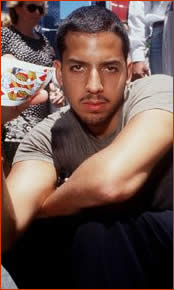
---------------------------------------
The Blaine Backlash
Okay, it's time I addressed the whole issue of TV magic, selective editing, and all those ridiculous hot-button issues launched into the magical stratosphere by the explosive popularity of Blaine's special. The job of the magician is not to be honest. It is, as Darwin Ortiz says in Strong Magic, "to create the illusion of impossibility." If you can use television to help create the illusion of impossibility, by all means do so. You'll be doing your job properly.
There's a lot of sniping directed his way regarding Street Magic's promiscuous use of reaction shots. Give ME the chance to film myself doing an effect fifty times and let ME pick the two or three best reactions out of fifty, and I'll seem like a genius, too, seems to be a common analysis. Well, guess what?
You're absolutely right. And if you ever get your own TV special, I'd certainly recommend that you pick out the best reactions to show, too. Why wouldn't you? Do you really think it would have been a better TV show, a better magic show, if Blaine had shown those times when people had been less blown away? Do you really think it would have honored magic to show the guy who said, "That's pretty cool. I used to do that stuff, too. Here, let me show you the trick with the three rows of seven cards..." blah blah blah?
Blaine (with rumored help from an uncredited Spike Lee) figured out a way to translate the very best experience of magic onto television: show people being blown away, floored, absolutely balls-out astonished. They become the eyes and ears of the people watching at home. Over the last ten years, probably the most common thing people tell me when they find out I'm a magician is that they love David Blaine (or, "that kid who does street magic") and still marvel at things they saw him do years ago.
------------------------------------------
Blaine's Influence
Blaine triggered a complete paradigm shift in the magical community.
No, scratch that, I'll come back to that paradigm shift in a moment. The existing magical community didn't change at all; in fact, it predictably responded with a vast reservoir of hostility. People absolutely hated that Blaine became a superstar doing what in many cases were tricks they had sitting in their magic drawers at home. They said, "I could have done that! I've had an Invisible Deck for years! I've used the Coin in Bottle for that gag for years! He's nothing special."
There it is, that moment of denial. Magicians everywhere should have been saying, "Holy smokes, look at all the powerful material I have available to me right now!
"Thanks, David Blaine, for showing me how to use it!"
Magicians the world over should have seen the success of Street Magic and concluded, "Oh, now I understand. People don't want lame patter about little sponge bunnies breeding, about Gypsies and fairy dust, about card elevators. They just want to be shown something impossible. They want to see their signed card put in the middle and suddenly -- magically -- be on the top."
And let's not get past the fact that Blaine's an extremely handsome and sexy guy. Right there, a lot of jealous magicians (who don't tend to fit the above description) were ready to write him off. Blaine uses his charisma and sex appeal on everyone, male and female, young and old. And -- bless my heart! -- he doesn't dress up all fancy, either! No tuxedos for Blaine; he performs on the streets in jeans and a tee-shirt. Another crime in the stuffy magic world circa 1997!
But here's the number one reason why a lot of magicians hated Blaine. Blaine was a mirror held up to other magicians which reflected back their own lameness. By 1997, magic had been in a decades-long slide into absolute mediocrity. After Street Magic, anyone who wasn't as good as Blaine suddenly found himself facing an educated audience no longer interested in sitting still for crappy magic tricks.

A boatload of terrible magicians had quietly poisoned the reputation of magic as an art for years. Even worse, they had gotten a free pass from the magic community.
Then Blaine came along and ruined it for all of them.
-----------------------------------------------
Saving Magic: The New Generation
Although the mainstream of magic failed to embrace Blaine, an entire generation of young magicians has grown up in his sphere of influence. Indeed, a most amazing thing has happened as a direct result of that first Street Magic special: magic has become hip. The "street magic" style popularized by Blaine is now all over the Web, in the spawn of Penguin and Ellusionist, and in clever young performers like Daniel Garcia, Wayne Houchin, and Morgan Strebler.
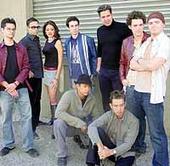
TV shows like T.H.E.M.(Totally Hidden Extreme Magic) and Mondo Magic brought cutting-edge magic to a whole new audience. T.H.E.M. featured the performance group Magic X, which includes PeaceLove's Musings fave Cyril Takayama. Probably the most high-profile magician of the moment is Criss Angel, star of A&E's Mindfreak. Angel is a major talent in his own right, but his show is undeniably an offspring of Blaine, combining as it does roving street magic with Blaine's other great breakthrough: endurance stunts.
--------------------------------------
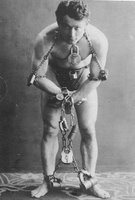
Blaine has spoken at length about his admiration for Houdini, a Hungarian-born Jew who grew up dirt poor and rose to become one of the most famous and idolized entertainers in the world. Although Houdini began and ended his career as a magician, his greatest fame came through his extraordinary ability to convince the world he could escape from any type of restraint. As part of his mythos, Houdini presented himself as almost a superman, a man more physically gifted than others. To this end, he trained himself as a contortionist, learned to hold his breath for minutes at a time, and made sure to have himself photographed frequently in little more than a loincloth -- the better to show off his impressive physique.
Blaine was smart enough to realize early on that he had taken "street magic" about as far as it could go. By the time his later specials aired, the Web was full of sites explaining many of the basic effects Blaine made famous, including the Balducci levitation. Blaine must have understood that in order to build his fame and reputation he would have to move on to bigger and better things. So he began to formulate the endurance stunts that now dominate his specials -- sixty-one hours encased in a block of ice on Times Square, thirty-five hours atop a small platform a hundred feet in the air, ending with a jump down onto a pile of boxes, and, most famously, forty-four days fasting in a glass box suspended over the River Thames in London.

Blaine isn't the first magician to attempt far-out endurance stunts, but he is the first geniune superstar since Houdini to do so. He has been able to present his endurance feats as spiritual trials, a quest to further the bounds of his personal abilities -- and, by extension, to demonstrate to his audience that humans are capable of truly extraordinary levels of survival and endurance. Blaine always maintains a stance of absolute humility; he continually expresses that he is grateful for the opportunity to explore his own limits. (In this, he has distinguished himself from his idol Houdini, by all accounts one of the least humble performers in history.)
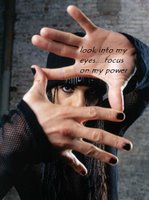
This stance, this framing of the endurance trials as some sort of higher calling, a quest to find and exceed the outer limits of the physically possible -- this is yet another area where Criss Angel owes a huge and largely unacknowledged debt to Blaine.
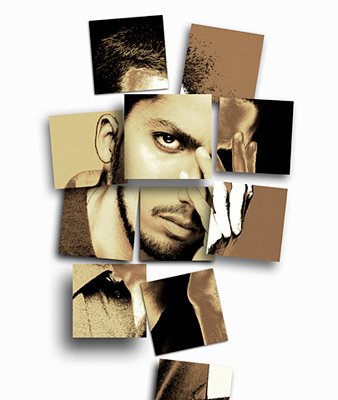
Drowned Alive
On May 1st, Blaine will begin his latest performance. He plans to spend seven days on public display submerged in a tank of water (with food and oxygen lines), at the end of which he will attempt to hold his breath for almost nine minutes. It's a bold, brilliant step in a provocative career, and I for one will be watching ABC on May 8th when it all comes down to the wire.
-----------------------
This post has been corrected since it first went up. Please see the comments for my embarrassing mistakes.
UPDATE: 12/12/10
Below are some follow-up posts on Blaine:
Racherbaumer on Blaine
Baine - Drowned Alive
MCJ on Blaine (from 2004)
Burden to Ono to Blaine
Blaine and Me
